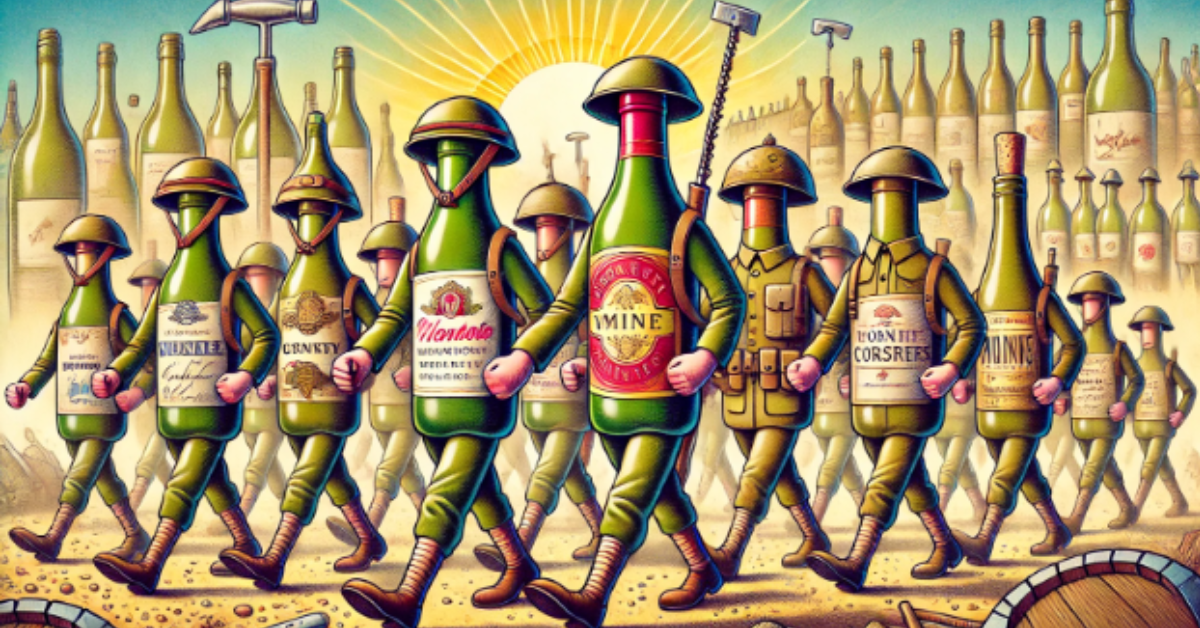Wine & Spirits Sales: 8 Ways Military Discipline Ensures Success
The more you dive into why military outfits train and drill relentlessly, the more parallels you will see in building a high-performance sales team...
6 min read
 Ben Salisbury
:
2/9/24 1:58 AM
Ben Salisbury
:
2/9/24 1:58 AM
The most common pushback wine and spirits sales leaders and owners get from their sales team in using CRM is that they don’t have time to use it. They’re “too busy selling,” which is absurdly paradoxical.
The bigger reason they resist is that they don’t see the point of it. And the reason that they don’t see the point of it has everything to do with how they approach the sales process.

Racing car carrying a bottle of wine.
There are two primary schools of thought regarding the approach salespeople use.
I will delve into the characteristics of these methodologies in detail below.
These two approaches couldn’t possibly be more disparate. And it grieves me to see our industry cling so vigorously yet foolishly to a way of selling that went out of fashion in the 1950s. But it is pervasive, nevertheless.
As a sales strategy expert and consultant to wineries and distilleries, I have countless opportunities to observe firsthand how salespeople sell wine and spirits. They work hard, care deeply about their customers, and believe in their hearts they are good at their jobs.
But, their effectiveness falls far short of their potential because they (and their managers) value effort and activity rather than strategy and discipline.
If only this dilemma were simply due to a lack of training. However, the stark reality is that many owners and leaders of our industry actively seek out transactional salespeople. This is an all too common mistake.
A cursory scan of a typical ad in winejobs.com makes this abundantly clear. The desired skills and attributes they seek of prospective candidates are spelled in bullet point form for all the world to see.
I’ve always believed in the adage that to those who understand, no explanation is needed, and to those who don’t understand, no explanation will suffice. Nevertheless, I intend to give it my best shot in this article because it is desperately needed.
Let’s start by diving into the two primary sales approaches.
The transactional approach is the oldest and, by far, the most common approach to sales. It relies heavily on presenting, overcoming objections, and closing. The vast majority of sales training programs currently in existence attempt to improve these skills.
Transactional salespeople adhere stubbornly to the features and benefits approach to achieve “success.”
A die-on-the-sword tenet of this approach is that more sales calls equate to more sales.
Most salespeople don’t know of and have never been exposed to any other way to sell.
Many of the world’s largest consumer products companies no longer utilize this antiquated style of selling, but the wine and spirits industry clings to it vehemently.
The strategic approach is far more complex, sophisticated, and scientific. It relies heavily on human psychology and seeks to understand deeply what moves people to buy.
Strategic selling recognizes that the presentation is merely one step in a protracted process. They respect that a buyer’s purchase decisions are part of a journey that unfolds in stages (not an in-the-moment transaction).
It also recognizes that not all accounts are of equal value and employs a disciplined use of time guided by objective, empirical data to maximize sales results in each sales territory.
It is indeed a less-is-more approach, but there is more to it than that. The 80/20 Rule is not only real but leverageable.
In fact, “leverage” is the key to accelerating sales performance. Leveraging time, data, technology, and deep knowledge of how buyers make decisions.
The strategic approach is all about focus and discipline. It’s a process, and managing processes is where CRM really shines.
Salespeople practicing a transactional approach do not need to use CRM. Because they see the sales call as a repeatable, singular event and not part of a larger process, it is a pointless exercise in their minds, and they are absolutely correct.
Pay close attention to how your salespeople sell. Do they seek to get appointments above all else? Do they routinely make pitches to buyers they’ve never met before the presentation?
Does their presentation focus on the features and benefits of their products instead of what the buyer’s business needs are?
If your salespeople sell this way, you will never achieve the levels of revenue you so desperately want. Never.
A CRM system's power, ROI, and corresponding results can manifest only when part of a larger, more sophisticated, and vastly more effective strategy.
To climb the ladder of sales success, the ladder must be leaned against the right wall. There are two analogies I want to employ to illustrate the difference between these two “walls.”
Consider car racing as an example. The goal in racing is to get around the track as fast as possible for as many laps as possible until you win the race. If “speed” was all it took, then it’s reasonable to assume you simply press harder on the gas pedal. If speed were all it took, the car with the most powerful engine would win every time.
But as anyone who’s won a race can tell you, there’s far more to racing than speed and power. There’s a “method “ to racing. It’s part art and part science (just like in sales).
Take corning, for example. Logic would dictate that the fastest way around a corner is the shortest way around the corner, but this is simply not true. Much more finesse is required. Taking the proper path through a corner requires great discipline and strategy (just like in sales).
It starts before you enter the corner - positioning your car for the turn ahead (just like in sales). In a lefthand turn, the driver wants to position their car to the far right until they can see the corner's apex (the point at which the car is closest to the inside edge of the usable track). This increases the radius of the turn, making it easier and wider to drive through, which results in the fastest way around.
Few salespeople leverage strategy. They focus on power (overcoming objections and closing techniques) and speed (more sales calls) rather than taking the extra time necessary to position themselves for success.
Every sports team is chock full of talented athletes. If talent and ability were enough, why do they need coaching?
In both sports and sales, the players don’t always act in the best interest of the team or company. They need coaches to instill strategy and provide balance.
Coaches have a unique perspective and see things the individual players and the team may not see. They are far enough removed from the action to deconstruct what’s not working and reconstruct it so the results are optimized.
The same is true for leaders of sales teams. Sales leaders keep their team members focused on the accounts and activities that will provide the greatest results.
The keys to winning in sports and sales are the same. The “game” is far too complex to rely solely on talent and effort. Winning consistently requires strategy.
Transactional salespeople see CRM as something they’re compelled to use. Strategic salespeople are captivated by CRM because it saves them time and helps them achieve far greater results.
One of the central components of a CRM system is the opportunity pipeline or “deal pipeline.” The recognition that selling is a process, not a transaction, cries out for a tool that can enable that process, and that tool, my friends, is CRM.
A “classic” sales pipeline has the following eight stages:
 A classic sales pipeline (a.k.a. "deal pipeline).
A classic sales pipeline (a.k.a. "deal pipeline).
Strategic salespeople know where each key account stands in this pipeline, what work is required in each stage, and the next steps to move them forward. They depend on their CRM system for their success!
By contrast, transactional salespeople see the word of selling like this:
 The simple sales transaction pipeline.
The simple sales transaction pipeline.
A salesperson who operates this way will never, ever accept the required use of CRM. The problem is not the CRM system. The problem is your company's approach to selling.
Now let’s pause for a moment to clear up a common misconception. Many salespeople erroneously confuse their depletion reporting system with CRM. Many depletion reporting systems indeed contain CRM capabilities, but the two are very distinct.
A “true” CRM system performs several critical functions:
If your depletion reporting system cannot fully serve all these CRM functions, you need two separate systems. Otherwise, it’s like riding a bicycle with only one tire.
Companies serious about achieving their sales and revenue goals must get serious about CRM. In this competitive category facing many headwinds, you really don’t have much choice.
Show me the “Kanban board view” of your Opportunity Pipeline, and I will show you how serious you are about having sales success.
If you want to achieve high levels of sales performance at your company, it starts with hiring the right people. If you want salespeople to be strategic instead of transactional, you must hire for that. To hire correctly, you must be very good at screening and interviewing.
It certainly is possible to transform transactional salespeople into strategic salespeople, but it’s difficult. Too many will never leap because they’ve been doing it the old-fashioned way for far too long.
But even the very best salespeople still need training in using CRM, and it is your responsibility as sales leaders and business owners to provide it for them.
But there is help available if you need it! I’d be very happy to have a brief discussion with you to talk through your situation. Simply click here to contact me.
In the meantime, feel free to check out my new online training program options. There’s no need for plane tickets or hotel rooms. All of this can now be done online using a combination of self-paced videos and live coaching sessions via Zoom.

The more you dive into why military outfits train and drill relentlessly, the more parallels you will see in building a high-performance sales team...

When it comes to working with alcohol distributors in 2023, one of the biggest mistakes I see winery and distillery owners make is depending too much...
.png)
I’m not sure if the word “hobby” is appropriate, but whatever you call it, I’ve been studying and collecting job descriptions for many years, and...